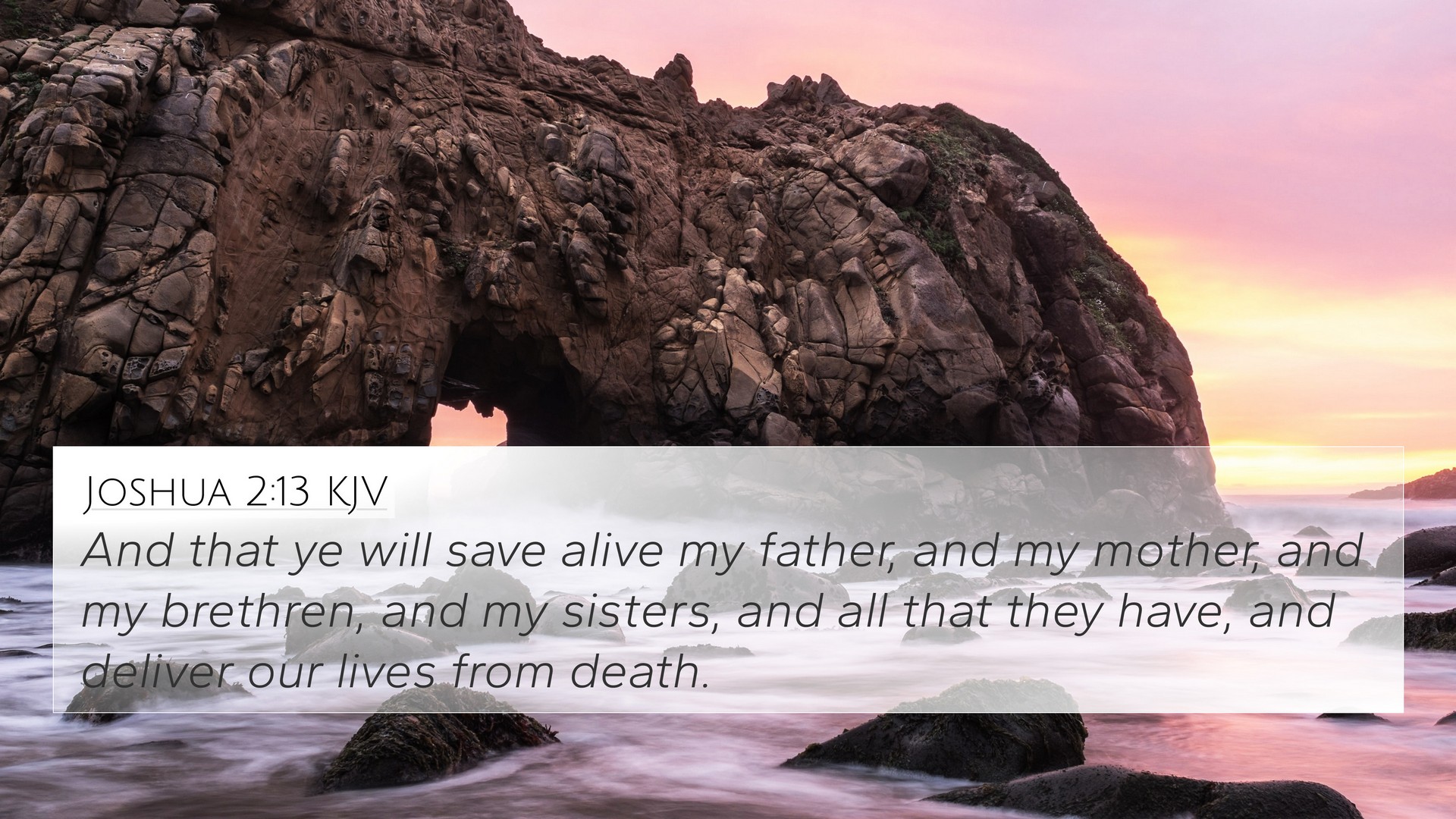Old Testament
Genesis Exodus Leviticus Numbers Deuteronomy Joshua Judges Ruth 1 Samuel 2 Samuel 1 Kings 2 Kings 1 Chronicles 2 Chronicles Ezra Nehemiah Esther Job Psalms Proverbs Ecclesiastes Song of Solomon Isaiah Jeremiah Lamentations Ezekiel Daniel Hosea Joel Amos Obadiah Jonah Micah Nahum Habakkuk Zephaniah Haggai Zechariah MalachiJoshua 2:13 Similar Verses
Joshua 2:13 Cross References
And that ye will save alive my father, and my mother, and my brethren, and my sisters, and all that they have, and deliver our lives from death.
Uncover the Rich Themes and Topics of This Bible Verse
Listed below are the Bible themes associated with Joshua 2:13. We invite you to explore each theme to gain deeper insights into the Scriptures.
Joshua 2:13 Cross Reference Verses
No cross reference images were found in our system for this Bible passage.
Joshua 2:13 Verse Analysis and Similar Verses
Understanding Joshua 2:13
Verse: Joshua 2:13 states: "And that you will save alive my father, and my mother, and my brethren, and my sisters, and all that they have, and deliver our lives from death."
Overview
This verse captures a pivotal moment in the narrative of Israel's conquest of Canaan, where Rahab, a resident of Jericho, negotiates for the safety of her family in exchange for her assistance to the Israelite spies. Her recognition of the impending destruction of Jericho reflects both her faith and her strategic mind, emphasizing the importance of connections within scripture.
Commentary Insights
-
Matthew Henry's Commentary
Matthew Henry highlights Rahab's boldness and faith in God, seeing her plea as a model of intercession. He emphasizes that her request is not only for personal salvation, but for the deliverance of her family, showcasing her concern for loved ones and her understanding of the dire situation faced by Jericho.
-
Albert Barnes' Notes
Albert Barnes points out that Rahab's acknowledgment of the spies solidifies her conversion and faith in the God of Israel. He notes that her appeal emphasizes the mercy of God, demonstrating how one person's faith can lead to familial salvation. This aligns with the overarching theme of redemption found throughout the Bible.
-
Adam Clarke's Commentary
Adam Clarke observes the cultural implications of Rahab's request, noting the importance of familial ties in her society. Clarke argues that this highlights a significant principle in Scripture: the priority of family relationships within the larger narrative of redemption. Rahab’s faith stands as a testament to the power of God to save, even in dire circumstances.
Thematic Bible Verse Connections
This verse is interconnected with several other scriptures that enhance its understanding:
- Hebrews 11:31 - "By faith, the harlot Rahab did not perish with those who did not believe, when she had received the spies with peace." This illustrates Rahab's faith as a means of salvation.
- Matthew 1:5 - "Salmon begot Boaz by Rahab." Rahab's inclusion in the genealogy of Jesus emphasizes her significance in biblical history.
- Romans 10:13 - "For whoever calls on the name of the Lord shall be saved." This thematic connection highlights the idea of calling for mercy and salvation.
- Acts 16:31 - "Believe on the Lord Jesus Christ, and you will be saved, you and your household." This aligns with Rahab’s concern for her family.
- Genesis 19:17 - The angel's command to Lot to flee Sodom and save his family reflects a similar theme of familial salvation in the face of judgment.
- Proverbs 11:30 - "The fruit of the righteous is a tree of life, and he who wins souls is wise." This can be applied to Rahab's actions as a wise woman seeking salvation for her family.
- Psalm 91:14-16 - "Because he has set his love upon Me, therefore I will deliver him; I will set him on high, because he has known My name." This reflects the assurance of salvation for those who love and trust God.
The Importance of Cross-Referencing
To fully appreciate Joshua 2:13, using tools for Bible cross-referencing is vital. Through the practice of cross-referencing Bible study, one can unveil deeper connections and themes across the text. This not only enriches understanding but also reveals the holistic narrative of God's plan for salvation.
By employing a Bible concordance or a cross-reference Bible study guide, individuals can explore how various verses tie into the central theme of redemption and familial responsibility. These tools aid in discovering parallels and themes that resonate throughout the scriptures.
Conclusion
Joshua 2:13 stands as a testimony to the significance of faith, family, and the benevolence of God. Through the intercessions of Rahab, we see a beautiful representation of how faith can transcend circumstances to bring about salvation. The study of this verse and its connections prompts deeper reflection on how we understand and engage with the scriptures, promoting a comprehensive spiritual dialogue.


